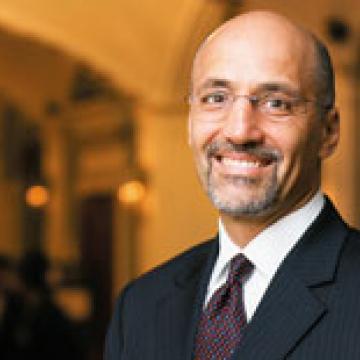Veering off the road from Paris
President Trump has pulled out of the Paris Climate Accord. Now we're driving alone.
[A version of this article appears in US News & World Report]
If you think of the Paris Climate Accord as the dashed white line separating lanes on an interstate, each country is a car on the road. All of the traffic is traveling in the same direction, but each vehicle is able to change lanes, moving faster or slower, based on its economy. The lanes are clear, giving drivers confidence of direction and speed. But the lines are dashed because staying in any lane is voluntary.
Direction matters because the Paris Accord dictates that all parties (including China and India) take on similar obligations—again, driving toward the same destination—and that those commitments must be achievable, based on measures that have already been put into effect. If countries are moving faster or slower than their pledge, there is flexibility to adjust accordingly.
Paris is particularly important because it coaxed India and China onto the highway in the first place. Before that, these emerging economies were functioning more as road blocks. The entry of India and China was enough to satisfy the U.S. and Europe. And it appears to have worked: China’s reduction of carbon dioxide emissions looks to be ahead of schedule by more than a decade; India, by about eight years.
But with President Trump’s announcement on Thursday that the United States is pulling out of the Paris Accord, it is clear that we have decided to drive off the road. There is no longer a clear direction. The president doesn’t believe the highway should even exist. He would rather drive alone on a polluted dirt path from 50 years ago.
The hope now is that the rest of the world—the other 98 percent of countries, representing 75 percent of world GDP and 85 percent of global emissions—will stay on the highway. Europe, China, and India will lead. American businesses will continue to follow the standards they set but will end up losing ground in the clean-energy market—and clean-energy jobs—to innovative companies around the world.
Following Trump’s confrontational stance at last week’s G7 meeting over climate change and other issues, the president’s staff raised hopes that he would choose to stay in the Paris climate deal. Trump’s national security advisor, H.R. McMaster, and his national economic council director, Gary Cohn, together penned an op-ed in the Wall Street Journal on Tuesday, declaring that “America First does not mean America alone. It is a commitment to protecting and advancing our vital interests while also fostering cooperation and strengthening relationships with our allies and friends.”
That message is now shattered.
Why do I care so deeply about this? Because climate change is among the most important challenges facing the world. We are the first generation in history to fully understand the dangers of climate change. We are also the last generation with a chance to do something about it.
More than that, the Paris Climate Accord is personal to me. During my time working in the Clinton White House, I had two jobs: managing G7 summitry and working on climate change negotiations. I reported to (among others) the national security advisor and the national economic advisor, providing me a window into the complex diplomacy and economics of climate change—and the very personal politics among heads of state.
In the year before President Obama was elected, I co-authored an article that sketched a path forward. My co-author, Todd Stern, went on to become the lead U.S. negotiator of the Paris Accord.
To be clear: Climate issues have been a challenge for two decades. In 1997 and 1998, when I was at the White House, President Clinton wrestled long and hard with EU leaders over climate issues, including at the G7. As he famously quipped to a number of us after the United States hosted the G7 in Denver in 1997, the Europeans “made me look like the skunk at my own garden party.”
President George W. Bush had it tough, too. After he pulled out of the Kyoto treaty on global warming in 2001, protests and riots erupted during his first G7 summit. Bush was worried about developing countries who were left out of Kyoto, believing it put an undue burden on the United States.
Yet the Paris Accord fixed that. It included China and India and built on the climate-change principles that Bush advocated in his final years in office. Obama then extended and amplified those concepts, and worked hard to bring in China and India.
A true sign of the Paris Accord’s success: Mitt Romney, John Kasich, and Exxon Mobil all support the U.S. commitment.
Now the United States has veered off of the climate road that the entire world built together. Europe is still on course. China and India are too. But we will be cutting a new path, alone in the wilderness.
William Antholis is the CEO and director of the nonpartisan Miller Center for Public Affairs at the University of Virginia. The views expressed in this op-ed are his own and do not represent the Miller Center.
